BMP4002 Business Law: Analysis of the UK Legal System & Employment
VerifiedAdded on 2023/06/07
|10
|2521
|370
Report
AI Summary
This report provides a comprehensive overview of the UK legal system, focusing on its classifications, sources, and application to employment law. It begins by defining laws and identifying the legal systems in the UK, differentiating between civil and criminal law with examples. The roles of the High Court and Supreme Court are explained, followed by an exploration of case law and legislation as sources of law, including delegated legislation. The report then delves into the UK law-making process, specifically examining statutory duties of employers, wrongful dismissal, and unfair dismissal actions within employment law. The report concludes that the legal framework aims to maintain order, protect citizens, and ensure the effective functioning of society through various legislative enactments.
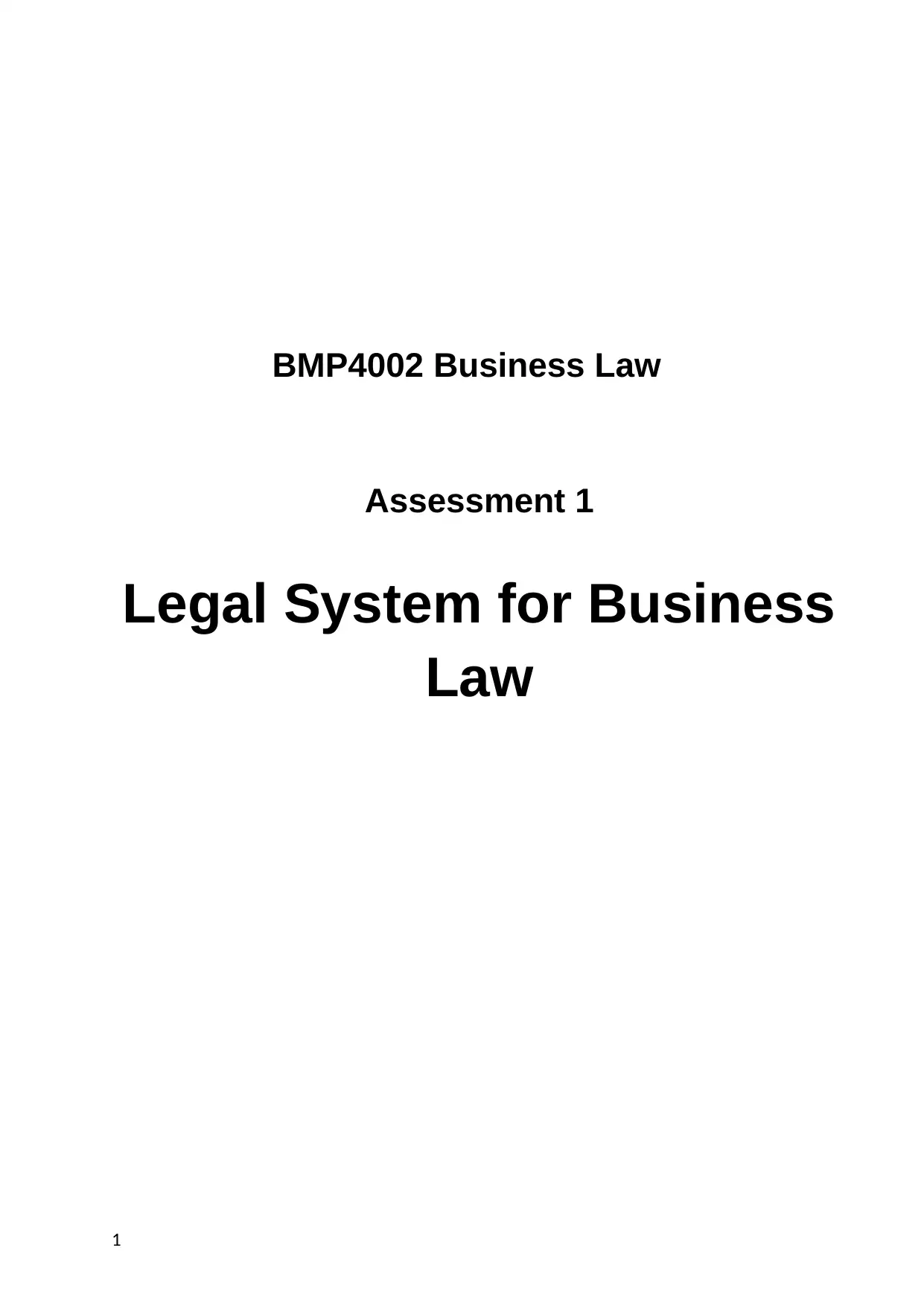
BMP4002 Business Law
Assessment 1
Legal System for Business
Law
1
Assessment 1
Legal System for Business
Law
1
Paraphrase This Document
Need a fresh take? Get an instant paraphrase of this document with our AI Paraphraser
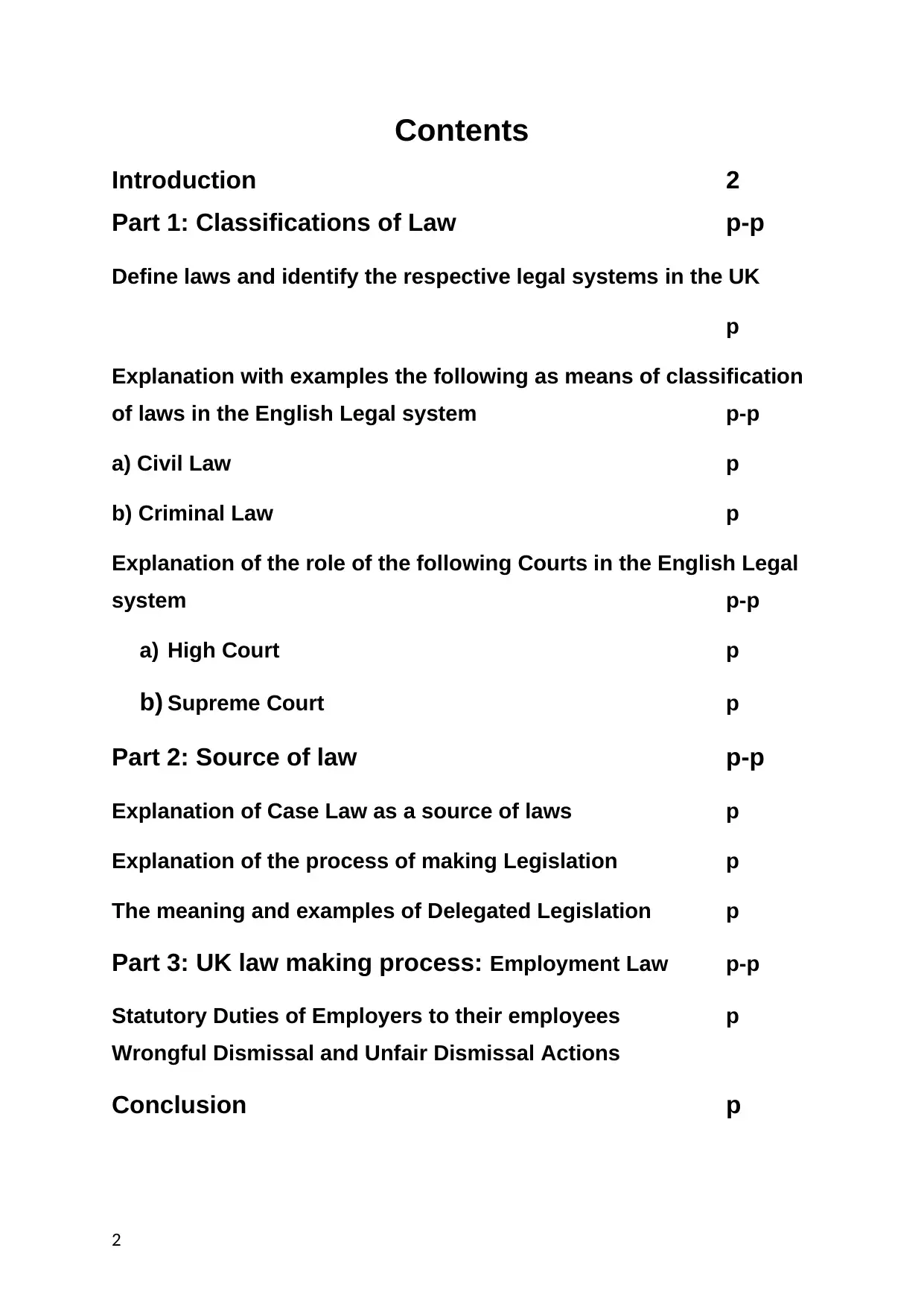
Contents
Introduction 2
Part 1: Classifications of Law p-p
Define laws and identify the respective legal systems in the UK
p
Explanation with examples the following as means of classification
of laws in the English Legal system p-p
a) Civil Law p
b) Criminal Law p
Explanation of the role of the following Courts in the English Legal
system p-p
a) High Court p
b) Supreme Court p
Part 2: Source of law p-p
Explanation of Case Law as a source of laws p
Explanation of the process of making Legislation p
The meaning and examples of Delegated Legislation p
Part 3: UK law making process: Employment Law p-p
Statutory Duties of Employers to their employees p
Wrongful Dismissal and Unfair Dismissal Actions
Conclusion p
2
Introduction 2
Part 1: Classifications of Law p-p
Define laws and identify the respective legal systems in the UK
p
Explanation with examples the following as means of classification
of laws in the English Legal system p-p
a) Civil Law p
b) Criminal Law p
Explanation of the role of the following Courts in the English Legal
system p-p
a) High Court p
b) Supreme Court p
Part 2: Source of law p-p
Explanation of Case Law as a source of laws p
Explanation of the process of making Legislation p
The meaning and examples of Delegated Legislation p
Part 3: UK law making process: Employment Law p-p
Statutory Duties of Employers to their employees p
Wrongful Dismissal and Unfair Dismissal Actions
Conclusion p
2

3
⊘ This is a preview!⊘
Do you want full access?
Subscribe today to unlock all pages.

Trusted by 1+ million students worldwide
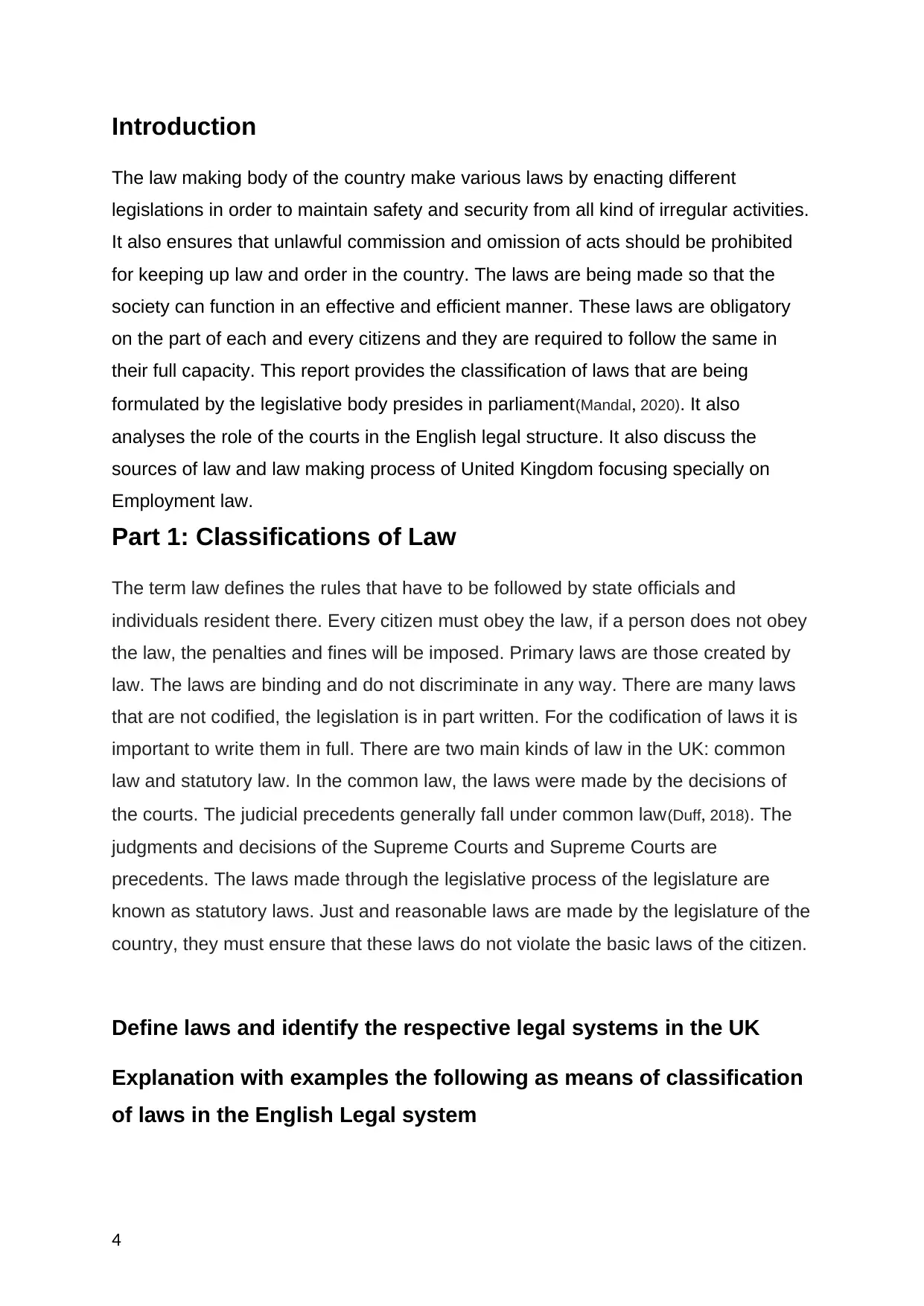
Introduction
The law making body of the country make various laws by enacting different
legislations in order to maintain safety and security from all kind of irregular activities.
It also ensures that unlawful commission and omission of acts should be prohibited
for keeping up law and order in the country. The laws are being made so that the
society can function in an effective and efficient manner. These laws are obligatory
on the part of each and every citizens and they are required to follow the same in
their full capacity. This report provides the classification of laws that are being
formulated by the legislative body presides in parliament(Mandal, 2020). It also
analyses the role of the courts in the English legal structure. It also discuss the
sources of law and law making process of United Kingdom focusing specially on
Employment law.
Part 1: Classifications of Law
The term law defines the rules that have to be followed by state officials and
individuals resident there. Every citizen must obey the law, if a person does not obey
the law, the penalties and fines will be imposed. Primary laws are those created by
law. The laws are binding and do not discriminate in any way. There are many laws
that are not codified, the legislation is in part written. For the codification of laws it is
important to write them in full. There are two main kinds of law in the UK: common
law and statutory law. In the common law, the laws were made by the decisions of
the courts. The judicial precedents generally fall under common law(Duff, 2018). The
judgments and decisions of the Supreme Courts and Supreme Courts are
precedents. The laws made through the legislative process of the legislature are
known as statutory laws. Just and reasonable laws are made by the legislature of the
country, they must ensure that these laws do not violate the basic laws of the citizen.
Define laws and identify the respective legal systems in the UK
Explanation with examples the following as means of classification
of laws in the English Legal system
4
The law making body of the country make various laws by enacting different
legislations in order to maintain safety and security from all kind of irregular activities.
It also ensures that unlawful commission and omission of acts should be prohibited
for keeping up law and order in the country. The laws are being made so that the
society can function in an effective and efficient manner. These laws are obligatory
on the part of each and every citizens and they are required to follow the same in
their full capacity. This report provides the classification of laws that are being
formulated by the legislative body presides in parliament(Mandal, 2020). It also
analyses the role of the courts in the English legal structure. It also discuss the
sources of law and law making process of United Kingdom focusing specially on
Employment law.
Part 1: Classifications of Law
The term law defines the rules that have to be followed by state officials and
individuals resident there. Every citizen must obey the law, if a person does not obey
the law, the penalties and fines will be imposed. Primary laws are those created by
law. The laws are binding and do not discriminate in any way. There are many laws
that are not codified, the legislation is in part written. For the codification of laws it is
important to write them in full. There are two main kinds of law in the UK: common
law and statutory law. In the common law, the laws were made by the decisions of
the courts. The judicial precedents generally fall under common law(Duff, 2018). The
judgments and decisions of the Supreme Courts and Supreme Courts are
precedents. The laws made through the legislative process of the legislature are
known as statutory laws. Just and reasonable laws are made by the legislature of the
country, they must ensure that these laws do not violate the basic laws of the citizen.
Define laws and identify the respective legal systems in the UK
Explanation with examples the following as means of classification
of laws in the English Legal system
4
Paraphrase This Document
Need a fresh take? Get an instant paraphrase of this document with our AI Paraphraser
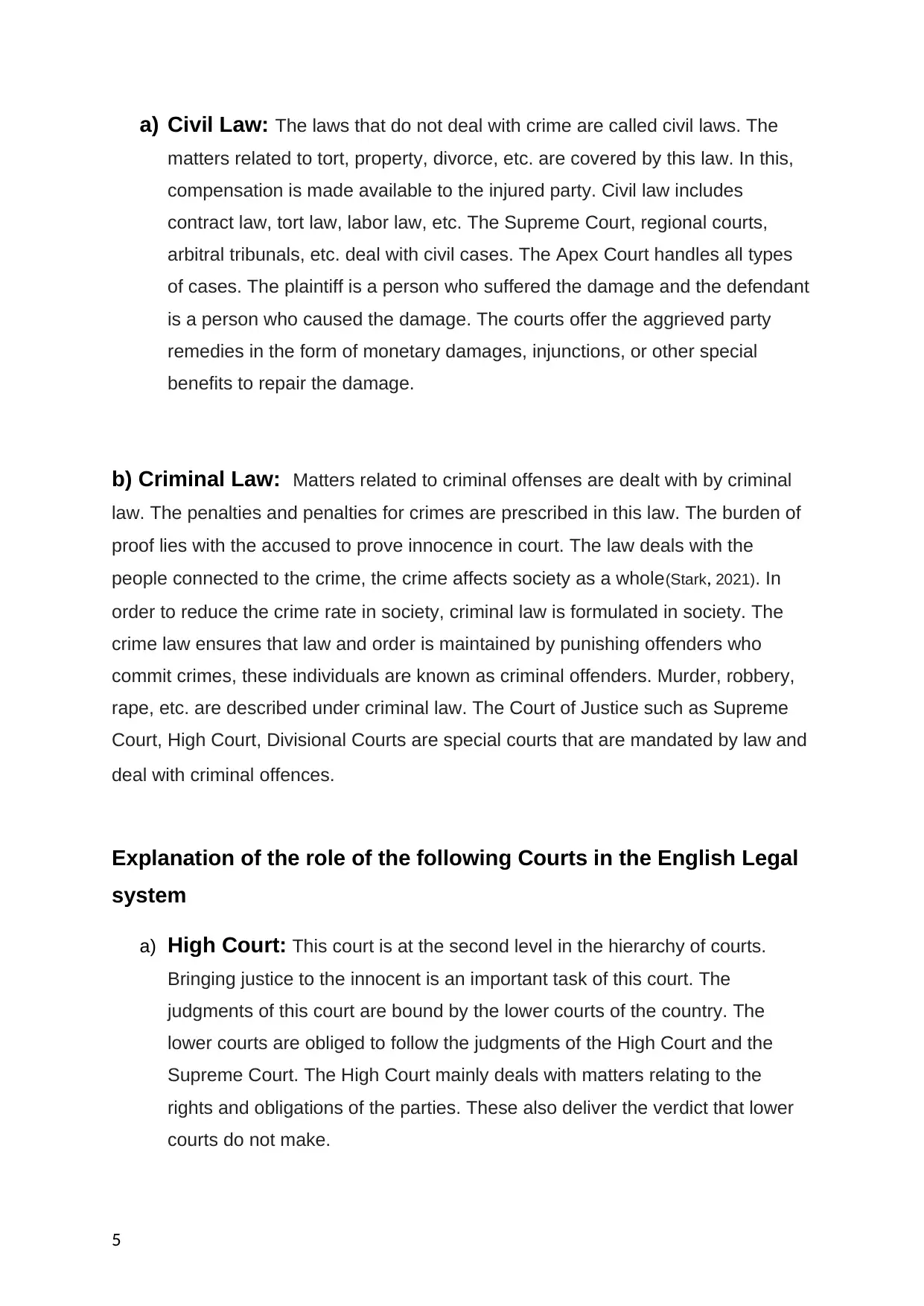
a) Civil Law: The laws that do not deal with crime are called civil laws. The
matters related to tort, property, divorce, etc. are covered by this law. In this,
compensation is made available to the injured party. Civil law includes
contract law, tort law, labor law, etc. The Supreme Court, regional courts,
arbitral tribunals, etc. deal with civil cases. The Apex Court handles all types
of cases. The plaintiff is a person who suffered the damage and the defendant
is a person who caused the damage. The courts offer the aggrieved party
remedies in the form of monetary damages, injunctions, or other special
benefits to repair the damage.
b) Criminal Law: Matters related to criminal offenses are dealt with by criminal
law. The penalties and penalties for crimes are prescribed in this law. The burden of
proof lies with the accused to prove innocence in court. The law deals with the
people connected to the crime, the crime affects society as a whole(Stark, 2021). In
order to reduce the crime rate in society, criminal law is formulated in society. The
crime law ensures that law and order is maintained by punishing offenders who
commit crimes, these individuals are known as criminal offenders. Murder, robbery,
rape, etc. are described under criminal law. The Court of Justice such as Supreme
Court, High Court, Divisional Courts are special courts that are mandated by law and
deal with criminal offences.
Explanation of the role of the following Courts in the English Legal
system
a) High Court: This court is at the second level in the hierarchy of courts.
Bringing justice to the innocent is an important task of this court. The
judgments of this court are bound by the lower courts of the country. The
lower courts are obliged to follow the judgments of the High Court and the
Supreme Court. The High Court mainly deals with matters relating to the
rights and obligations of the parties. These also deliver the verdict that lower
courts do not make.
5
matters related to tort, property, divorce, etc. are covered by this law. In this,
compensation is made available to the injured party. Civil law includes
contract law, tort law, labor law, etc. The Supreme Court, regional courts,
arbitral tribunals, etc. deal with civil cases. The Apex Court handles all types
of cases. The plaintiff is a person who suffered the damage and the defendant
is a person who caused the damage. The courts offer the aggrieved party
remedies in the form of monetary damages, injunctions, or other special
benefits to repair the damage.
b) Criminal Law: Matters related to criminal offenses are dealt with by criminal
law. The penalties and penalties for crimes are prescribed in this law. The burden of
proof lies with the accused to prove innocence in court. The law deals with the
people connected to the crime, the crime affects society as a whole(Stark, 2021). In
order to reduce the crime rate in society, criminal law is formulated in society. The
crime law ensures that law and order is maintained by punishing offenders who
commit crimes, these individuals are known as criminal offenders. Murder, robbery,
rape, etc. are described under criminal law. The Court of Justice such as Supreme
Court, High Court, Divisional Courts are special courts that are mandated by law and
deal with criminal offences.
Explanation of the role of the following Courts in the English Legal
system
a) High Court: This court is at the second level in the hierarchy of courts.
Bringing justice to the innocent is an important task of this court. The
judgments of this court are bound by the lower courts of the country. The
lower courts are obliged to follow the judgments of the High Court and the
Supreme Court. The High Court mainly deals with matters relating to the
rights and obligations of the parties. These also deliver the verdict that lower
courts do not make.
5
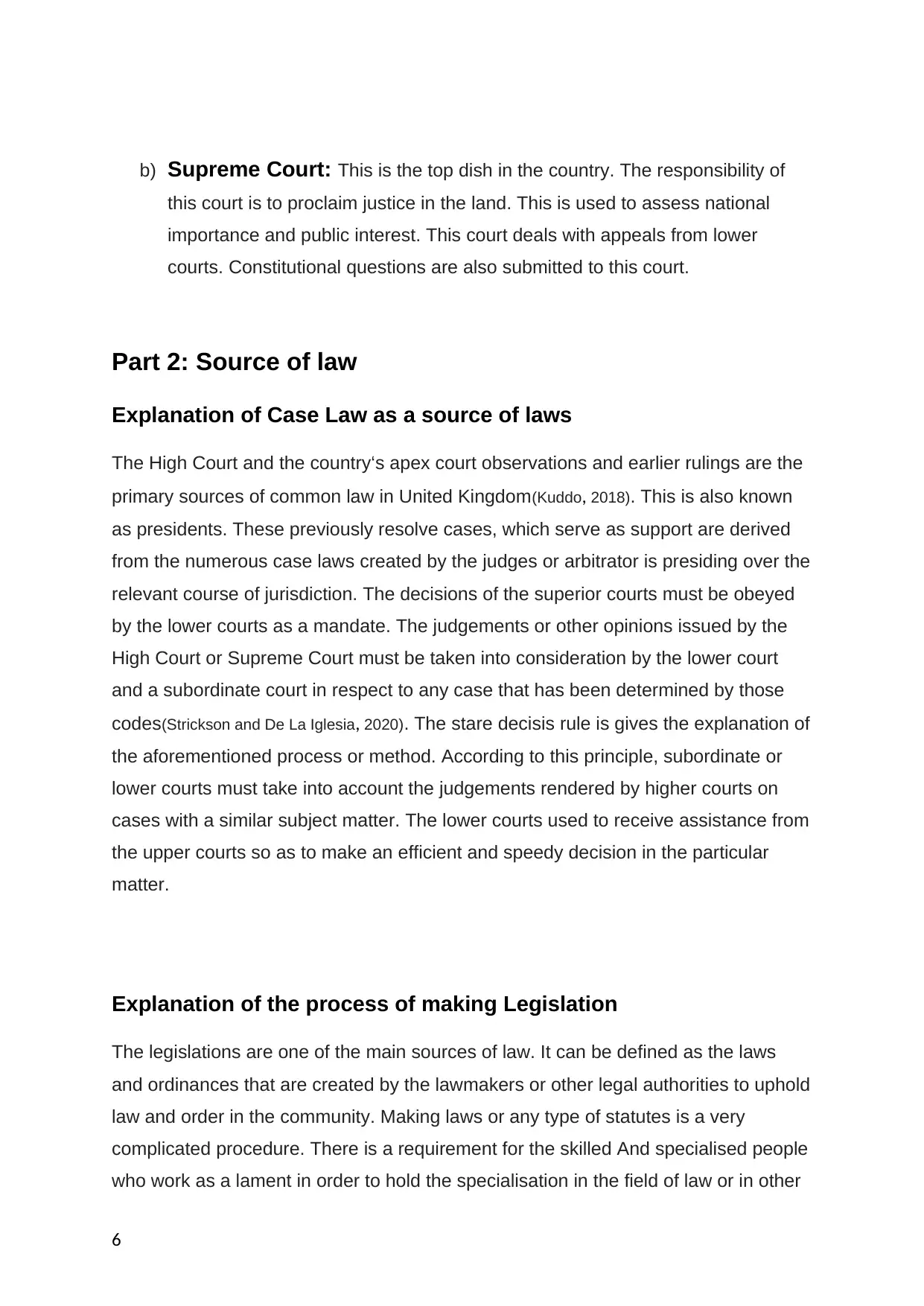
b) Supreme Court: This is the top dish in the country. The responsibility of
this court is to proclaim justice in the land. This is used to assess national
importance and public interest. This court deals with appeals from lower
courts. Constitutional questions are also submitted to this court.
Part 2: Source of law
Explanation of Case Law as a source of laws
The High Court and the country‘s apex court observations and earlier rulings are the
primary sources of common law in United Kingdom(Kuddo, 2018). This is also known
as presidents. These previously resolve cases, which serve as support are derived
from the numerous case laws created by the judges or arbitrator is presiding over the
relevant course of jurisdiction. The decisions of the superior courts must be obeyed
by the lower courts as a mandate. The judgements or other opinions issued by the
High Court or Supreme Court must be taken into consideration by the lower court
and a subordinate court in respect to any case that has been determined by those
codes(Strickson and De La Iglesia, 2020). The stare decisis rule is gives the explanation of
the aforementioned process or method. According to this principle, subordinate or
lower courts must take into account the judgements rendered by higher courts on
cases with a similar subject matter. The lower courts used to receive assistance from
the upper courts so as to make an efficient and speedy decision in the particular
matter.
Explanation of the process of making Legislation
The legislations are one of the main sources of law. It can be defined as the laws
and ordinances that are created by the lawmakers or other legal authorities to uphold
law and order in the community. Making laws or any type of statutes is a very
complicated procedure. There is a requirement for the skilled And specialised people
who work as a lament in order to hold the specialisation in the field of law or in other
6
this court is to proclaim justice in the land. This is used to assess national
importance and public interest. This court deals with appeals from lower
courts. Constitutional questions are also submitted to this court.
Part 2: Source of law
Explanation of Case Law as a source of laws
The High Court and the country‘s apex court observations and earlier rulings are the
primary sources of common law in United Kingdom(Kuddo, 2018). This is also known
as presidents. These previously resolve cases, which serve as support are derived
from the numerous case laws created by the judges or arbitrator is presiding over the
relevant course of jurisdiction. The decisions of the superior courts must be obeyed
by the lower courts as a mandate. The judgements or other opinions issued by the
High Court or Supreme Court must be taken into consideration by the lower court
and a subordinate court in respect to any case that has been determined by those
codes(Strickson and De La Iglesia, 2020). The stare decisis rule is gives the explanation of
the aforementioned process or method. According to this principle, subordinate or
lower courts must take into account the judgements rendered by higher courts on
cases with a similar subject matter. The lower courts used to receive assistance from
the upper courts so as to make an efficient and speedy decision in the particular
matter.
Explanation of the process of making Legislation
The legislations are one of the main sources of law. It can be defined as the laws
and ordinances that are created by the lawmakers or other legal authorities to uphold
law and order in the community. Making laws or any type of statutes is a very
complicated procedure. There is a requirement for the skilled And specialised people
who work as a lament in order to hold the specialisation in the field of law or in other
6
⊘ This is a preview!⊘
Do you want full access?
Subscribe today to unlock all pages.

Trusted by 1+ million students worldwide
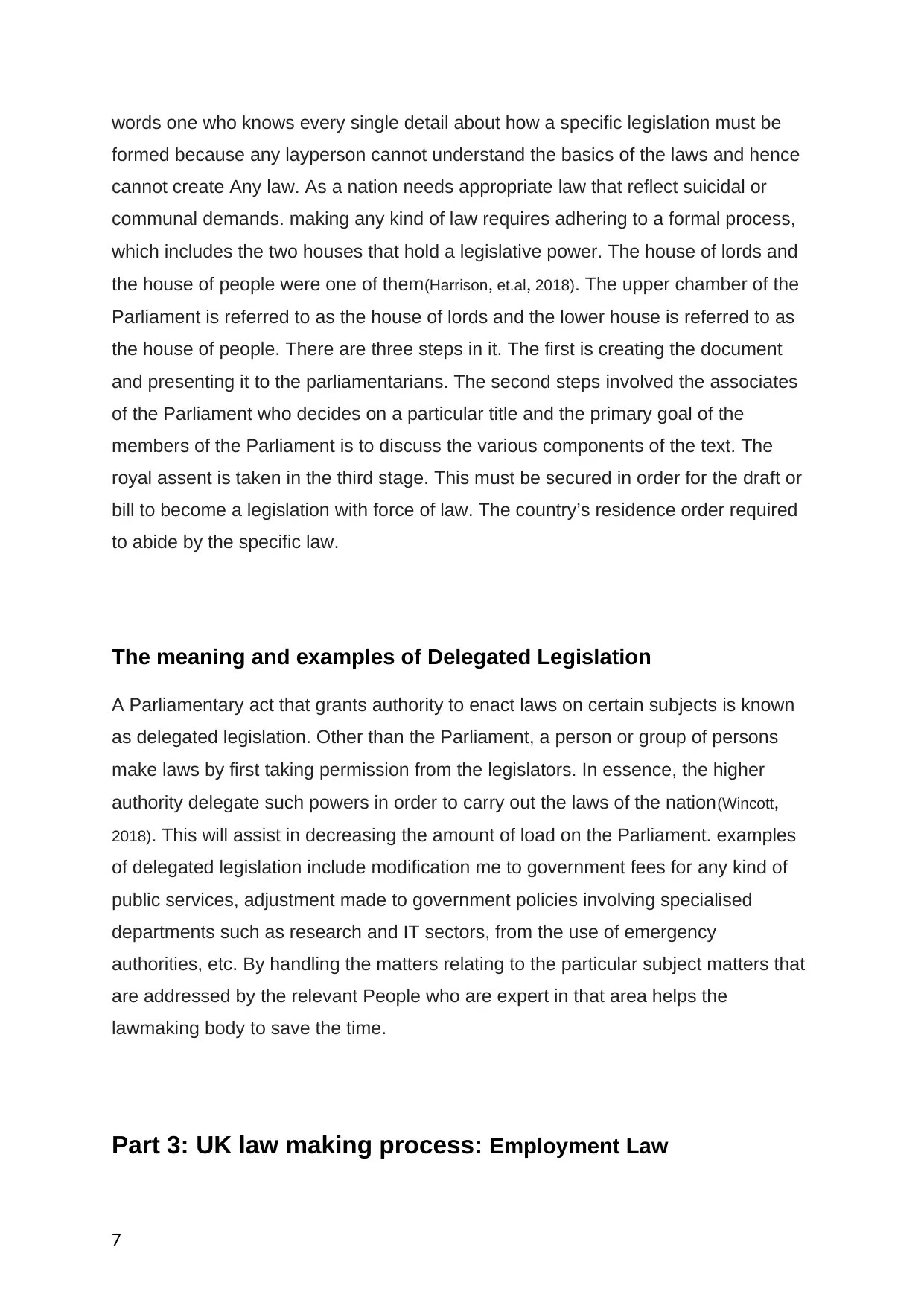
words one who knows every single detail about how a specific legislation must be
formed because any layperson cannot understand the basics of the laws and hence
cannot create Any law. As a nation needs appropriate law that reflect suicidal or
communal demands. making any kind of law requires adhering to a formal process,
which includes the two houses that hold a legislative power. The house of lords and
the house of people were one of them(Harrison, et.al, 2018). The upper chamber of the
Parliament is referred to as the house of lords and the lower house is referred to as
the house of people. There are three steps in it. The first is creating the document
and presenting it to the parliamentarians. The second steps involved the associates
of the Parliament who decides on a particular title and the primary goal of the
members of the Parliament is to discuss the various components of the text. The
royal assent is taken in the third stage. This must be secured in order for the draft or
bill to become a legislation with force of law. The country’s residence order required
to abide by the specific law.
The meaning and examples of Delegated Legislation
A Parliamentary act that grants authority to enact laws on certain subjects is known
as delegated legislation. Other than the Parliament, a person or group of persons
make laws by first taking permission from the legislators. In essence, the higher
authority delegate such powers in order to carry out the laws of the nation(Wincott,
2018). This will assist in decreasing the amount of load on the Parliament. examples
of delegated legislation include modification me to government fees for any kind of
public services, adjustment made to government policies involving specialised
departments such as research and IT sectors, from the use of emergency
authorities, etc. By handling the matters relating to the particular subject matters that
are addressed by the relevant People who are expert in that area helps the
lawmaking body to save the time.
Part 3: UK law making process: Employment Law
7
formed because any layperson cannot understand the basics of the laws and hence
cannot create Any law. As a nation needs appropriate law that reflect suicidal or
communal demands. making any kind of law requires adhering to a formal process,
which includes the two houses that hold a legislative power. The house of lords and
the house of people were one of them(Harrison, et.al, 2018). The upper chamber of the
Parliament is referred to as the house of lords and the lower house is referred to as
the house of people. There are three steps in it. The first is creating the document
and presenting it to the parliamentarians. The second steps involved the associates
of the Parliament who decides on a particular title and the primary goal of the
members of the Parliament is to discuss the various components of the text. The
royal assent is taken in the third stage. This must be secured in order for the draft or
bill to become a legislation with force of law. The country’s residence order required
to abide by the specific law.
The meaning and examples of Delegated Legislation
A Parliamentary act that grants authority to enact laws on certain subjects is known
as delegated legislation. Other than the Parliament, a person or group of persons
make laws by first taking permission from the legislators. In essence, the higher
authority delegate such powers in order to carry out the laws of the nation(Wincott,
2018). This will assist in decreasing the amount of load on the Parliament. examples
of delegated legislation include modification me to government fees for any kind of
public services, adjustment made to government policies involving specialised
departments such as research and IT sectors, from the use of emergency
authorities, etc. By handling the matters relating to the particular subject matters that
are addressed by the relevant People who are expert in that area helps the
lawmaking body to save the time.
Part 3: UK law making process: Employment Law
7
Paraphrase This Document
Need a fresh take? Get an instant paraphrase of this document with our AI Paraphraser
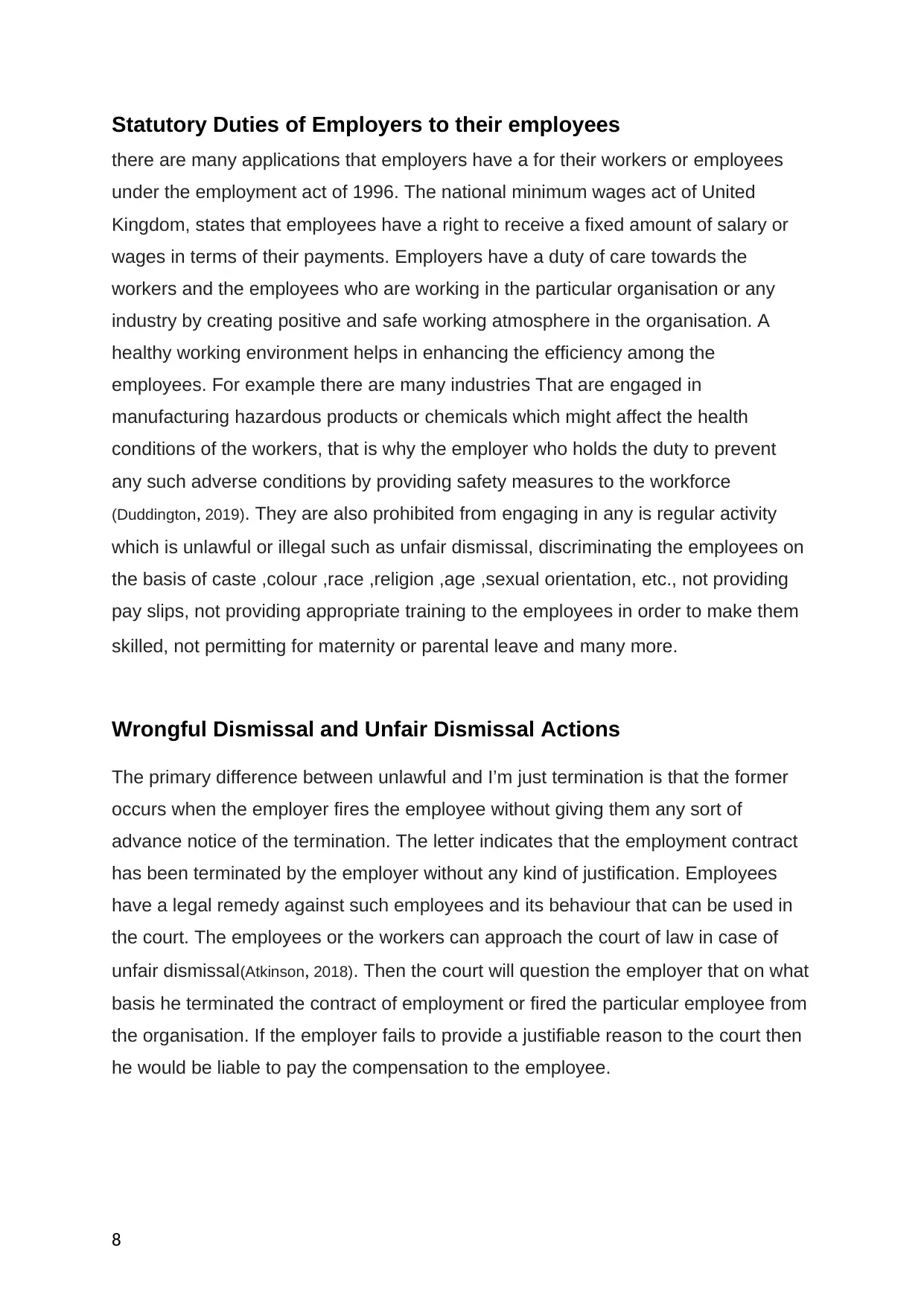
Statutory Duties of Employers to their employees
there are many applications that employers have a for their workers or employees
under the employment act of 1996. The national minimum wages act of United
Kingdom, states that employees have a right to receive a fixed amount of salary or
wages in terms of their payments. Employers have a duty of care towards the
workers and the employees who are working in the particular organisation or any
industry by creating positive and safe working atmosphere in the organisation. A
healthy working environment helps in enhancing the efficiency among the
employees. For example there are many industries That are engaged in
manufacturing hazardous products or chemicals which might affect the health
conditions of the workers, that is why the employer who holds the duty to prevent
any such adverse conditions by providing safety measures to the workforce
(Duddington, 2019). They are also prohibited from engaging in any is regular activity
which is unlawful or illegal such as unfair dismissal, discriminating the employees on
the basis of caste ,colour ,race ,religion ,age ,sexual orientation, etc., not providing
pay slips, not providing appropriate training to the employees in order to make them
skilled, not permitting for maternity or parental leave and many more.
Wrongful Dismissal and Unfair Dismissal Actions
The primary difference between unlawful and I’m just termination is that the former
occurs when the employer fires the employee without giving them any sort of
advance notice of the termination. The letter indicates that the employment contract
has been terminated by the employer without any kind of justification. Employees
have a legal remedy against such employees and its behaviour that can be used in
the court. The employees or the workers can approach the court of law in case of
unfair dismissal(Atkinson, 2018). Then the court will question the employer that on what
basis he terminated the contract of employment or fired the particular employee from
the organisation. If the employer fails to provide a justifiable reason to the court then
he would be liable to pay the compensation to the employee.
8
there are many applications that employers have a for their workers or employees
under the employment act of 1996. The national minimum wages act of United
Kingdom, states that employees have a right to receive a fixed amount of salary or
wages in terms of their payments. Employers have a duty of care towards the
workers and the employees who are working in the particular organisation or any
industry by creating positive and safe working atmosphere in the organisation. A
healthy working environment helps in enhancing the efficiency among the
employees. For example there are many industries That are engaged in
manufacturing hazardous products or chemicals which might affect the health
conditions of the workers, that is why the employer who holds the duty to prevent
any such adverse conditions by providing safety measures to the workforce
(Duddington, 2019). They are also prohibited from engaging in any is regular activity
which is unlawful or illegal such as unfair dismissal, discriminating the employees on
the basis of caste ,colour ,race ,religion ,age ,sexual orientation, etc., not providing
pay slips, not providing appropriate training to the employees in order to make them
skilled, not permitting for maternity or parental leave and many more.
Wrongful Dismissal and Unfair Dismissal Actions
The primary difference between unlawful and I’m just termination is that the former
occurs when the employer fires the employee without giving them any sort of
advance notice of the termination. The letter indicates that the employment contract
has been terminated by the employer without any kind of justification. Employees
have a legal remedy against such employees and its behaviour that can be used in
the court. The employees or the workers can approach the court of law in case of
unfair dismissal(Atkinson, 2018). Then the court will question the employer that on what
basis he terminated the contract of employment or fired the particular employee from
the organisation. If the employer fails to provide a justifiable reason to the court then
he would be liable to pay the compensation to the employee.
8
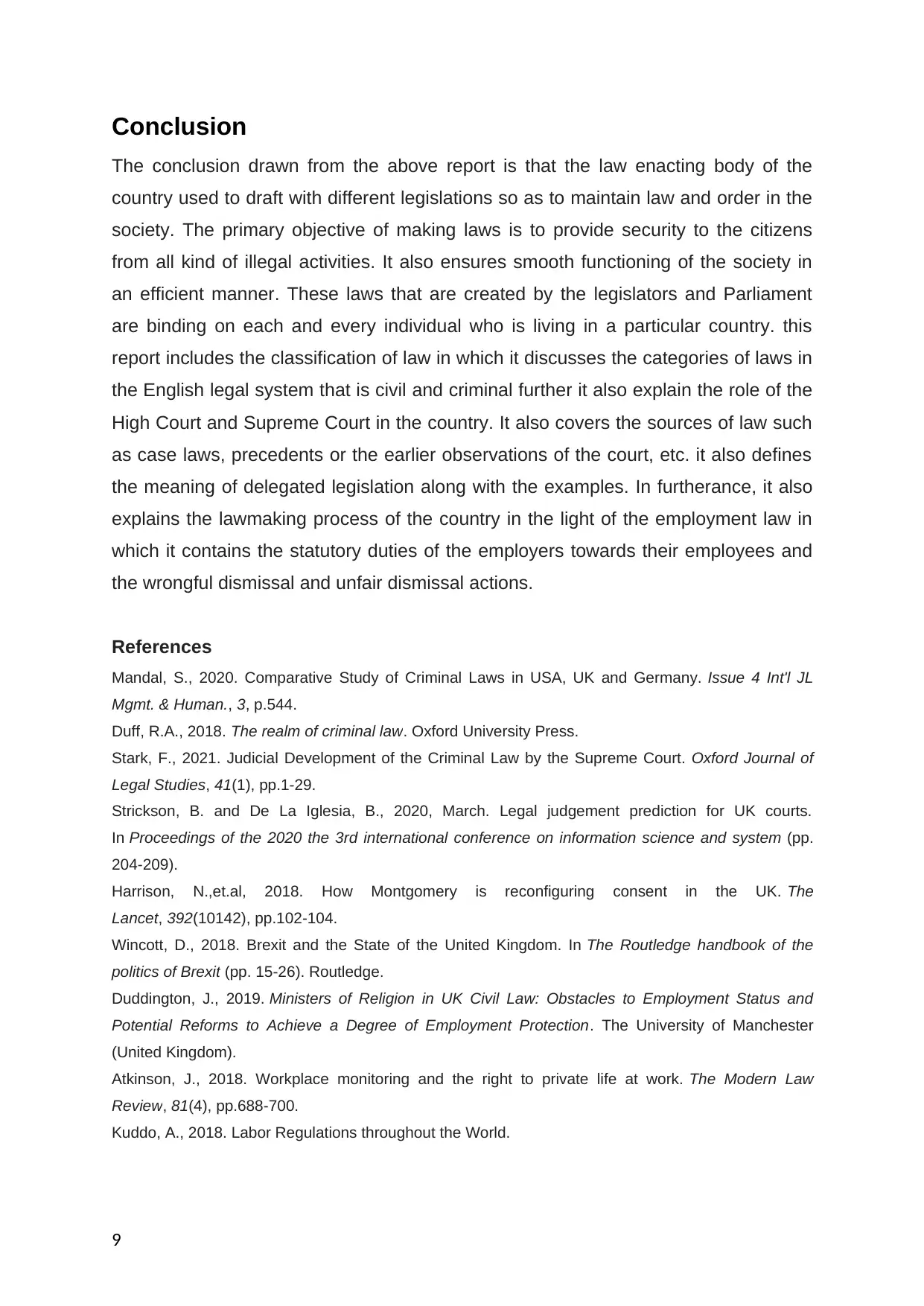
Conclusion
The conclusion drawn from the above report is that the law enacting body of the
country used to draft with different legislations so as to maintain law and order in the
society. The primary objective of making laws is to provide security to the citizens
from all kind of illegal activities. It also ensures smooth functioning of the society in
an efficient manner. These laws that are created by the legislators and Parliament
are binding on each and every individual who is living in a particular country. this
report includes the classification of law in which it discusses the categories of laws in
the English legal system that is civil and criminal further it also explain the role of the
High Court and Supreme Court in the country. It also covers the sources of law such
as case laws, precedents or the earlier observations of the court, etc. it also defines
the meaning of delegated legislation along with the examples. In furtherance, it also
explains the lawmaking process of the country in the light of the employment law in
which it contains the statutory duties of the employers towards their employees and
the wrongful dismissal and unfair dismissal actions.
References
Mandal, S., 2020. Comparative Study of Criminal Laws in USA, UK and Germany. Issue 4 Int'l JL
Mgmt. & Human., 3, p.544.
Duff, R.A., 2018. The realm of criminal law. Oxford University Press.
Stark, F., 2021. Judicial Development of the Criminal Law by the Supreme Court. Oxford Journal of
Legal Studies, 41(1), pp.1-29.
Strickson, B. and De La Iglesia, B., 2020, March. Legal judgement prediction for UK courts.
In Proceedings of the 2020 the 3rd international conference on information science and system (pp.
204-209).
Harrison, N.,et.al, 2018. How Montgomery is reconfiguring consent in the UK. The
Lancet, 392(10142), pp.102-104.
Wincott, D., 2018. Brexit and the State of the United Kingdom. In The Routledge handbook of the
politics of Brexit (pp. 15-26). Routledge.
Duddington, J., 2019. Ministers of Religion in UK Civil Law: Obstacles to Employment Status and
Potential Reforms to Achieve a Degree of Employment Protection. The University of Manchester
(United Kingdom).
Atkinson, J., 2018. Workplace monitoring and the right to private life at work. The Modern Law
Review, 81(4), pp.688-700.
Kuddo, A., 2018. Labor Regulations throughout the World.
9
The conclusion drawn from the above report is that the law enacting body of the
country used to draft with different legislations so as to maintain law and order in the
society. The primary objective of making laws is to provide security to the citizens
from all kind of illegal activities. It also ensures smooth functioning of the society in
an efficient manner. These laws that are created by the legislators and Parliament
are binding on each and every individual who is living in a particular country. this
report includes the classification of law in which it discusses the categories of laws in
the English legal system that is civil and criminal further it also explain the role of the
High Court and Supreme Court in the country. It also covers the sources of law such
as case laws, precedents or the earlier observations of the court, etc. it also defines
the meaning of delegated legislation along with the examples. In furtherance, it also
explains the lawmaking process of the country in the light of the employment law in
which it contains the statutory duties of the employers towards their employees and
the wrongful dismissal and unfair dismissal actions.
References
Mandal, S., 2020. Comparative Study of Criminal Laws in USA, UK and Germany. Issue 4 Int'l JL
Mgmt. & Human., 3, p.544.
Duff, R.A., 2018. The realm of criminal law. Oxford University Press.
Stark, F., 2021. Judicial Development of the Criminal Law by the Supreme Court. Oxford Journal of
Legal Studies, 41(1), pp.1-29.
Strickson, B. and De La Iglesia, B., 2020, March. Legal judgement prediction for UK courts.
In Proceedings of the 2020 the 3rd international conference on information science and system (pp.
204-209).
Harrison, N.,et.al, 2018. How Montgomery is reconfiguring consent in the UK. The
Lancet, 392(10142), pp.102-104.
Wincott, D., 2018. Brexit and the State of the United Kingdom. In The Routledge handbook of the
politics of Brexit (pp. 15-26). Routledge.
Duddington, J., 2019. Ministers of Religion in UK Civil Law: Obstacles to Employment Status and
Potential Reforms to Achieve a Degree of Employment Protection. The University of Manchester
(United Kingdom).
Atkinson, J., 2018. Workplace monitoring and the right to private life at work. The Modern Law
Review, 81(4), pp.688-700.
Kuddo, A., 2018. Labor Regulations throughout the World.
9
⊘ This is a preview!⊘
Do you want full access?
Subscribe today to unlock all pages.

Trusted by 1+ million students worldwide

10
1 out of 10
Related Documents
Your All-in-One AI-Powered Toolkit for Academic Success.
+13062052269
info@desklib.com
Available 24*7 on WhatsApp / Email
![[object Object]](/_next/static/media/star-bottom.7253800d.svg)
Unlock your academic potential
Copyright © 2020–2026 A2Z Services. All Rights Reserved. Developed and managed by ZUCOL.


